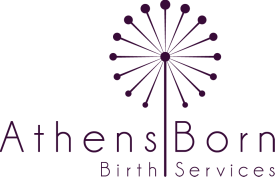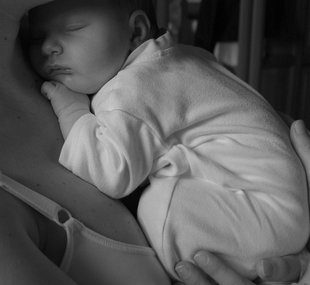There are two common questions that postpartum doulas hear in regards to their work…
Question 1: What exactly do you do?
A professional postpartum doula can help ease the anxiety and workload that comes along with the transition following a birth. Doulas provide both emotional support and hands-on help to a family, allowing parents time to bond with baby, snuggle older siblings, and take a refreshing shower or much needed nap. Every family has different needs, but typical duties might include helping a mother with breastfeeding, providing guidance on infant care and postpartum recovery, preparing meals, doing laundry, washing dishes or bottles, running errands and helping care for siblings. A professional doula is knowledgeable about other local services a family may need (support groups, mental health care providers, lactation consultants, chiropractors, massage therapists, etc) and can help with referrals. A doula may come for a few hours during the day or help the family overnight, when needed. She may also spend time with the parents helping them process feelings about their birth, answering questions about physical and emotional changes, and providing encouragement and reassurance that they can handle the new adventures to come.
Question 2: Do people really need that?
Yes. Because times have changed.
Most of the time, I’m grateful to live in this day and age. I like my car, I like my smart phone. I’m a big fan of central heating and cooling. These are all good things. However, postpartum care is one area where a modern attitude may be causing women more harm than good. The days and weeks after the birth of a baby used to be a time of turning inward for a woman. She and her little one would be sheltered by family and friends, safe and warm in a haven away from the outside world, as she settled into parenting and the baby became accustomed to life on the outside. The new parent’s job was to rest, recover, and care for her little one while others tended to siblings and managed other tasks and needs.
But, like many traditions in our society, this one has faded away over time. The postpartum period has now become a time where women are expected to turn outward rather than inward, and they’re expected to do it quickly. Rather than being allowed to focus on baby within the intimate circle of loved ones, society tells new parents to get up, get moving, and get on with life. Friends and family are clamoring for social media updates and photos from the first minutes after baby arrives. The clock starts ticking and the family is sent home just 48 hours after birth…and while baby sees a pediatrician within the first week, the woman doesn’t usually see her healthcare provider for six weeks. Spouses or partners are rarely given more than a couple of days off work and most birthing parents are considered very lucky if given six weeks of unpaid maternity leave.
Parents are expected to do it all on their own these days. Adjust to a completely new life, care for a newborn, master breastfeeding, cook, clean, run errands, walk the dog, entertain visiting family, and do it all while sleep-deprived. And, because we live in a society that loudly praises independence and self-sufficiency, most parents feel like they should be able to do it all.
Sadly, many of them end up enjoying their first few weeks and months as parents much less than they could have, if they’d just had one important thing: Support.
Many people don’t have support systems in place to help them through this time. These days, more and more families are spread across the country or even across the world. Friends may live far away or have demanding jobs and families of their own that prevent them from lending a hand as often as they’d like. So, in these postmodern times, who is caring for a woman as she cares for a baby? It’s a pretty tall order for one partner, not to mention those who are single-parenting, welcoming multiples or premature babies, or recovering from a traumatic or complicated birth. This is why a postpartum doula can be of valuable service to a family. To offer support in a seamless, unobtrusive, non-judgmental way.
All families deserve a gentle transition into their new way of life and a little help as they get their collective feet under them. Hiring a postpartum doula is a gift to a family…the gift of knowledgeable and experienced support, of time, and of peace of mind.
Take care,
Kate
Question 1: What exactly do you do?
A professional postpartum doula can help ease the anxiety and workload that comes along with the transition following a birth. Doulas provide both emotional support and hands-on help to a family, allowing parents time to bond with baby, snuggle older siblings, and take a refreshing shower or much needed nap. Every family has different needs, but typical duties might include helping a mother with breastfeeding, providing guidance on infant care and postpartum recovery, preparing meals, doing laundry, washing dishes or bottles, running errands and helping care for siblings. A professional doula is knowledgeable about other local services a family may need (support groups, mental health care providers, lactation consultants, chiropractors, massage therapists, etc) and can help with referrals. A doula may come for a few hours during the day or help the family overnight, when needed. She may also spend time with the parents helping them process feelings about their birth, answering questions about physical and emotional changes, and providing encouragement and reassurance that they can handle the new adventures to come.
Question 2: Do people really need that?
Yes. Because times have changed.
Most of the time, I’m grateful to live in this day and age. I like my car, I like my smart phone. I’m a big fan of central heating and cooling. These are all good things. However, postpartum care is one area where a modern attitude may be causing women more harm than good. The days and weeks after the birth of a baby used to be a time of turning inward for a woman. She and her little one would be sheltered by family and friends, safe and warm in a haven away from the outside world, as she settled into parenting and the baby became accustomed to life on the outside. The new parent’s job was to rest, recover, and care for her little one while others tended to siblings and managed other tasks and needs.
But, like many traditions in our society, this one has faded away over time. The postpartum period has now become a time where women are expected to turn outward rather than inward, and they’re expected to do it quickly. Rather than being allowed to focus on baby within the intimate circle of loved ones, society tells new parents to get up, get moving, and get on with life. Friends and family are clamoring for social media updates and photos from the first minutes after baby arrives. The clock starts ticking and the family is sent home just 48 hours after birth…and while baby sees a pediatrician within the first week, the woman doesn’t usually see her healthcare provider for six weeks. Spouses or partners are rarely given more than a couple of days off work and most birthing parents are considered very lucky if given six weeks of unpaid maternity leave.
Parents are expected to do it all on their own these days. Adjust to a completely new life, care for a newborn, master breastfeeding, cook, clean, run errands, walk the dog, entertain visiting family, and do it all while sleep-deprived. And, because we live in a society that loudly praises independence and self-sufficiency, most parents feel like they should be able to do it all.
Sadly, many of them end up enjoying their first few weeks and months as parents much less than they could have, if they’d just had one important thing: Support.
Many people don’t have support systems in place to help them through this time. These days, more and more families are spread across the country or even across the world. Friends may live far away or have demanding jobs and families of their own that prevent them from lending a hand as often as they’d like. So, in these postmodern times, who is caring for a woman as she cares for a baby? It’s a pretty tall order for one partner, not to mention those who are single-parenting, welcoming multiples or premature babies, or recovering from a traumatic or complicated birth. This is why a postpartum doula can be of valuable service to a family. To offer support in a seamless, unobtrusive, non-judgmental way.
All families deserve a gentle transition into their new way of life and a little help as they get their collective feet under them. Hiring a postpartum doula is a gift to a family…the gift of knowledgeable and experienced support, of time, and of peace of mind.
Take care,
Kate


 RSS Feed
RSS Feed

